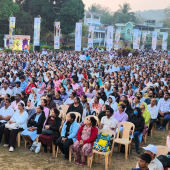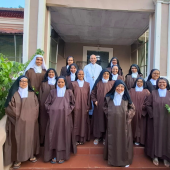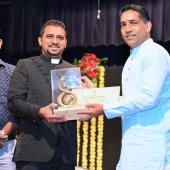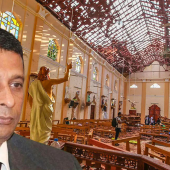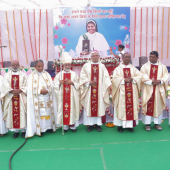Rooted in Faith, Open to Dialogue: Goa Symposium Highlights Unity Across Religions

In a vibrant testament to India’s spirit of dialogue and diversity, the Pilar Theological Institute and the Good Shepherd Institute of Theology jointly hosted an Inter-Seminary Theological Symposium on September 13, 2025, in Goa.
The theme, “Committed to One’s Faith, Collaboration with Other Faiths,” invited scholars, clergy, students, and laity to explore how authentic faith can open doors to mutual respect and harmony in an increasingly divided world.
A Call to Dialogue
Introducing the symposium, Dr. Fr. Ivon D. Almeida, SFX, convenor and faculty member at Pilar Theological Institute, reflected on the paradox of religion as both a messenger of peace and, at times, a source of division. “Religions meant to unite humanity are often manipulated to divide it,” he cautioned.
Placing the discussion in the Indian context, he highlighted the country’s extraordinary plurality of races, languages, tribes, and faiths, held together by a deeply spiritual worldview. While India has long been a cradle and custodian of the world’s religions, rising fundamentalism and political exploitation, he warned, continue to fuel intolerance and violence.
Fr. Almeida distinguished between relativism and true pluralism, reminding participants that genuine dialogue requires both rootedness in one’s faith and openness to others. “A mature faith is deeply grounded in its content yet expressed through adaptive techniques. It opens the door to genuine dialogue, living one’s faith authentically while engaging meaningfully with the world,” he said.
Voices from Different Faiths
The symposium featured three major presentations:
-
Hindu Perspective: Advocate Devender Saini, a Supreme Court lawyer, underlined the Supreme Court’s recognition of Hinduism as a “way of life.” He emphasized inter-religious harmony, urging the celebration of one another’s festivals and collaboration in education, environmental care, and disaster relief. “Hinduism’s true strength lies in its ability to assimilate diverse traditions and uphold unity in diversity, a message vital in today’s fractured world,” he concluded.
-
Islamic Perspective: Dr. Muniza Rafiq Khan, Registrar of the Gandhian Institute of Studies, Varanasi, highlighted Islam’s call for both deep commitment to faith and respectful cooperation with others. Countering misconceptions, she reminded participants that the Qur’an upholds freedom of religion, “there is no compulsion in religion” (2:256), and encourages kindness and justice toward all. She cited interfaith initiatives such as Iftar gatherings and Eid Milan celebrations as concrete examples of harmony in action.
-
Christian Perspective: Dr. Fr. Rajkumar Joseph, SJ, Principal of Vidyajyoti College, New Delhi, stressed that authentic dialogue begins with confidence in one’s own faith. “Faith should be firm, but not rigid. Dialogue should be respectful, not compromising,” he noted. Drawing on Vatican II, he described five forms of dialogue: life, action, theological exchange, religious experience, and conflict resolution, and called for building a “culture of encounter” where differences enrich rather than divide.
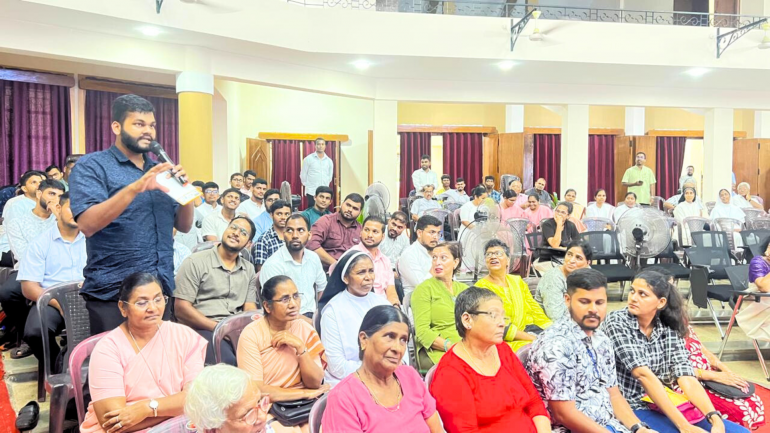
A Shared Experience
Participants spoke of how the symposium cleared misconceptions and inspired greater openness:
-
Pooja Prabudessai, a counselor, said the event encouraged youth to challenge preconceived notions and uphold India’s tradition of respecting all religions.
-
Fr. Patricio Fernandes, SJ, Rector of the Basilica of Bom Jesus, remarked that the symposium inspired him to “walk with all people, building bridges of love for peace and harmony.”
-
Sr. Gracy Lily, FS, called the dialogue “highly relevant today” for its emphasis on common human values, freedom of expression, and social justice.
-
Saania Sayed, a teacher at Al Madina High School, who attended with 20 students, found the sessions thought-provoking and the panel discussions engaging.
-
Marianinha D’Souza, observed that such symposiums are needed to understand and respect other faiths.
-
Sem. Brendon D’Costa of the Patriarchal Seminary of Rachol summed it up: “Such symposiums are essential for communal living, humanity must be primary, and religion secondary.”
Spirit of Unity
The day began with the lighting of the traditional lamp and a prayer service, with participation from seminarians, sisters, school students, madrasa representatives, and even a Hindu couple from Vasco. Scholastics presented reflections on their personal journeys of understanding Hinduism and Islam.
The sessions were sessions were moderated by Fr Agnelo Pinheiro of Good Shepherd Institute of Theology and the Panel discussion was moderated by Fr Ivon Almeida of Pilar Institute of Theology, with the post-lunch panel chaired by Fr. Almeida. The event concluded with words of gratitude, the presentation of mementos, and the singing of the national anthem.
Building Bridges for Tomorrow
The Inter-Seminary Theological Symposium in Goa was more than an academic exercise. It was a lived expression of India’s enduring tradition of dialogue and inclusivity. By rooting participants firmly in their own faith traditions while opening them to the beauty of others, the symposium underscored a timeless truth: that humanity is united not by uniformity, but by a shared calling to peace, justice, and love.
Radio Veritas Asia (RVA), a media platform of the Catholic Church, aims to share Christ. RVA started in 1969 as a continental Catholic radio station to serve Asian countries in their respective local language, thus earning the tag “the Voice of Asian Christianity.” Responding to the emerging context, RVA embraced media platforms to connect with the global Asian audience via its 21 language websites and various social media platforms.









